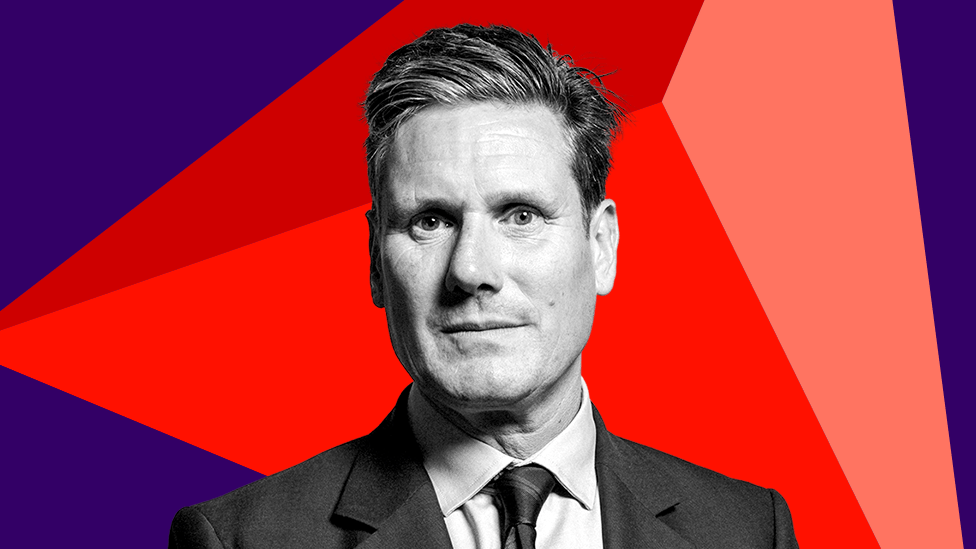Who is Labour leader Sir Keir Starmer?

- Published
Keir Starmer: The basics
Age: 61
Education: Reigate Grammar School, University of Leeds, University of Oxford
Family: Married to NHS occupational therapist Victoria Alexander. One son, one daughter
Parliamentary constituency: Holborn and St Pancras since 2015
Who is he?
The Labour leader frequently describes himself as being from a "working class background" and often references the "pebble-dash semi" in Oxted, Surrey, where he grew up.
His dad was a toolmaker and his mum worked as a nurse. His mother suffered from Still's disease, a rare autoimmune condition which eventually left her unable to speak or walk.
He went to Reigate Grammar School, which became a private school two years after he joined. His fees were paid by the local council until he was 16.
After school, he became the first in his family to go to university, studying law at Leeds and later Oxford.
In 1987, he became a barrister and developed a specialism in human rights law. His work took him to the Caribbean and Africa, where he defended prisoners facing the death penalty.
In the late 90s, he offered his services for free to the so-called McLibel activists who were pursued by McDonald's for distributing leaflets questioning the fast food giant's environmental claims.
In 2008, he was named the Director of Public Prosecutions, the most senior criminal prosecutor in England and Wales.
What was his route to power?
In 2015, he became the MP for Holborn and St Pancras in north London.
He served in former Labour leader Jeremy Corbyn's frontbench team as his shadow Brexit secretary, where he said holding a second EU referendum should be considered.
Following the party's heavy defeat in the 2019 general election, Sir Keir stood for leader - a contest he won in April 2020.
In his victory speech, he promised to lead Labour "into a new era with confidence and hope".

What are his key pledges?
Some of the policy pledges Labour has made so far include:
Healthcare: Cut NHS waiting lists by providing 40,000 more appointments each week, funded by tackling tax avoidance and closing tax ‘loopholes’
Immigration: Launch a ‘border security command’ to stop people-smuggling gangs from arranging small boat crossings.
Housing: Build 1.5m new homes by reforming planning laws and introduce a scheme to give first-time buyers "first dibs" in new housing developments
Education: Recruit 6,500 teachers, paid for by ending tax breaks for private schools.
What state are Labour in?
Since October 2021, Labour have led the Conservatives in the polls and have maintained a lead of around 20 percentage points since the start of 2023.
In the early years of his leadership, Sir Keir struggled to boost his party's poor poll ratings.
A humiliating by-election loss in Hartlepool in 2021 prompted a new focus on winning back voters in the so-called Red Wall. That's the term to describe constituencies in the North of England and the Midlands, once part of Labour's core vote, but won by Conservative party MPs in the 2019 election.
The rethink in policy led to Sir Keir abandoning pledges to abolish university tuition fees and nationalising energy and water companies.
Some on the left of his party have accused him of betrayal and broken promises.
Before Parliament shut down for the election, the party had 205 MPs. In order to win an outright majority it would need to win 326 seats.
BBC News will have a profile on each of the major party leaders running in the 2024 UK general election.